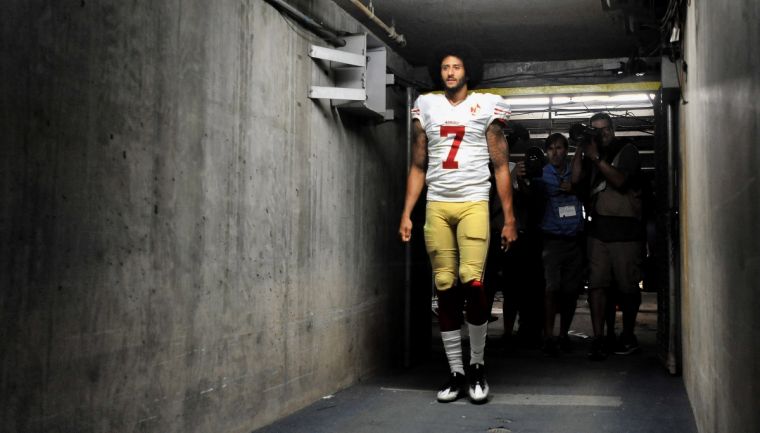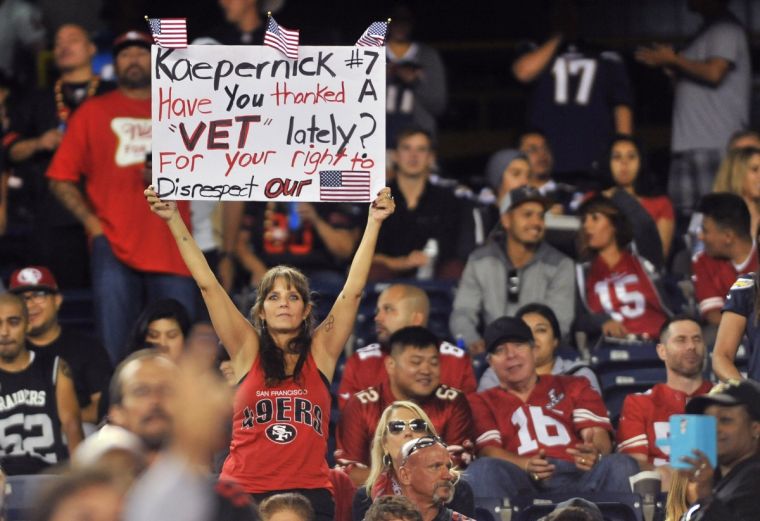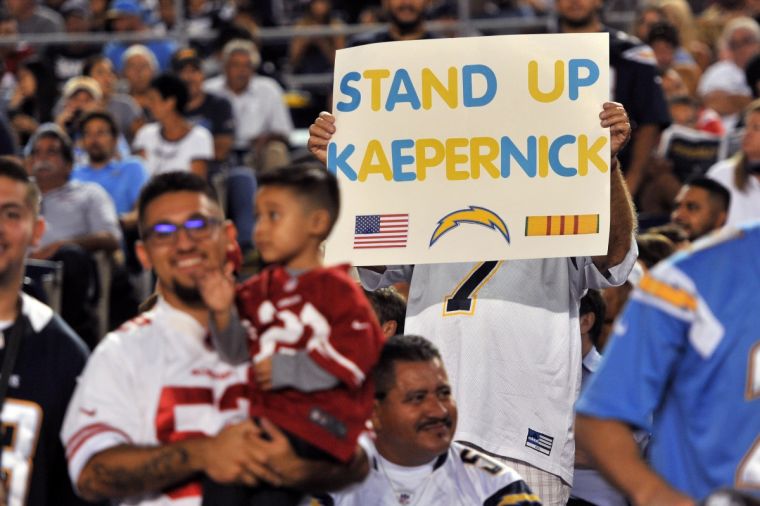Colin Kaepernick: Why his national anthem protests have touched a nerve

When Labour Party leader Jeremy Corbyn, a noted republican, declined to ask God to save our gracious Queen, his refusal to sing the national anthem made headline news.
Far more than most European countries, the US sets enormous store by public respect for patriotic institutions. The national anthem is one of these, right up there with the flag and the Pledge of Allegiance. So when San Francisco 49ers quarterback Colin Kaepernick started sitting down and then kneeling during pre-game anthems, it was noticed.
Kaepernick was demonstrating support for the Black Lives Matter cause, sparked by a series of killings by police of young black men. Kaepernick told the media on August 26: "I am not going to stand up to show pride in a flag for a country that oppresses black people and people of colour. To me, this is bigger than football and it would be selfish on my part to look the other way. There are bodies in the street and people getting paid leave and getting away with murder."

Kaepernick's right to protest was backed by his club and by the National Football League. In wider society it was met both with hostility – some fans tweeted pictures of themselves burning Kaepernick shirts and an NFL executive called him a traitor – and praise: and the protest is spreading. Other footballers who've joined in his stand include Broncos linebacker Brandon Marshall, Seahawks cornerback Jeremy Lane and 49ers safety Eric Reid. According to CBC Sports, a dozen NFL players have protested – some at a considerable cost.
Kaepernick himself is a believer who was baptised a Methodist, confirmed a Lutheran and attended a Baptist church during his college years. According to the Daily Sparks Tribune, he told a local church: "My faith is the basis from where my game comes from. I've been very blessed to have the talent to play the game that I do and be successful at it. I think God guides me through every day and helps me take the right steps and has helped me to get to where I'm at." He is liberally tattooed, with Bible verses among his inkings.
So how have the churches responded to his protests? An Alabama pastor and volunteer announcer, Allen Joyner, resigned after he was reported – wrongly, he says – to have said before a game: "If you don't want to stand for the national anthem, you can line up over there by the fence and let our military personnel take a few shots at you since they're taking shots for you." Lurid headlines followed about the pastor who called for Kaepernick supporters to be shot. (Joyner clarified: "I never said anybody should be shot. My words were, 'If you don't want to stand for the national anthem, please go sit at the baseball field and let some of our folks take a shot at reminding you of the price our military paid for your freedom to sit.'")

On the other hand, Kaepernick has received high-profile backing too. In an op-ed from the National Baptist Convention USA, Rev Dr Amos Brown, pastor of San Francisco's Third Baptist Church and chair of the Convention's Civil Rights & Political Action Commission, said Kaepernick had "challenged America, to match its creed and pledges with actions of justice, equality and peace for all".
He continued: "As a faith community, we are totally committed to maintain our support for the clarion call that Mr Kaepernick has sounded for common sense, justice, equality of opportunity and peace for all."
Needless to say, not everyone agrees with him – and reactions to Kaepernick's protest mirror reactions to the broader Black Lives Matter movement, which has proved deeply polarising in American society as a whole. It has spawned its own counter-movement, All Lives Matter – either a call for national unity and a protest against social divisiveness or a cynical dismissal of a burning social injustice, depending on your point of view.
#ColinKaepernick is forcing some white Americans to do what they hate most: confront their own privilege and talk about racial inequality.
— NoH8inDC (@NoH8inDC) September 16, 2016
What's different about Kaepernick's stand, however, is the way it strikes at the roots of nationalism. In every nation – and perhaps especially in the US – flag and anthem stand for something. They express, at a deep level, what people really believe about their country – and most people are eager to believe the best about it, not least because in doing so they are saying something about themselves. They are part of a greater whole, so a perceived attack on the whole is a personal attack on each part of the whole.
Cry baby Colin Kaepernick is issuing a set of demands for changes. OK Colin, we will jump right on that. Loser!
— Deplorable Martin (@MartinWiener) September 15, 2016
In the case of the US, the national myth – the story that defines America – is built around justice and goodness. America is on the side of the angels, and so the angels are on America's side. The rest of the world doesn't always see it that way, but as long as there's a national consensus that this is how things are, America can simply ignore that.
What's happening with the Black Lives Matter movement is that this national consensus is breaking down. Kaepernick's protest is so significant because he is challenging the idea of America. It isn't the land of the free; it's the land where some are free, but some are still in chains – not iron chains, but economic and social ones. And the difference between free and bound is still, says this movement, decided by skin colour.
It's one of the ironies of history that the administration of the black President Barack Obama has seen racial tension rise again in the US. Whether the next incumbent of the White House will be able to do anything about that is an open question. But the questions about the deep structure of American nationhood raised by Kaepernick and others deserve an answer, even if they make some people – mainly white people – deeply uncomfortable.











